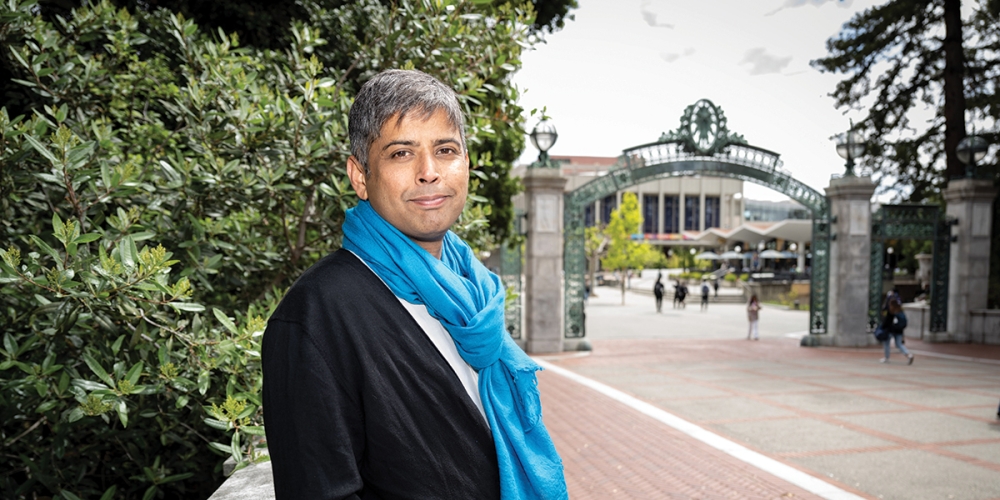

Research Bio
Trained in both history (Presidency College; Centre for Studies in Social Sciences, Calcutta) and art history (Maharaja Sayajirao University, Baroda; University of Minnesota), Sugata Ray’s research is on post-1400s art and architecture in South Asia with a focus on climate change and the environment, postcolonial geophilosophy, and posthumanist thought before colonial modernity. His first book Climate Change and the Art of Devotion: Geoaesthetics in the Land of Krishna, 1550–1850 examined the interrelationship between matter and life—both human and nonhuman—in shaping creative practices in the renowned Hindu pilgrimage site of Braj during the ecocatastrophes of the Little Ice Age (ca. 1550–1850). The book was awarded the 2021 Alice Davis Hitchcock Medallion by the Society of Architectural Historians of Great Britain, the 2020 Religion and the Arts Book Award by the American Academy of Religion, the College Art Association’s Millard Meiss Publication Fund, and was a finalist for the PROSE Award in Art History and Criticism. Climate Change and the Art of Devotion was also selected for the Andrew W. Mellon Foundation’s Art History Publication Initiative. As an extension of his interest in the field of eco art history, Ray coedited Water Histories of South Asia: The Materiality of Liquescence (2020; with Venugopal Maddipati, Ambedkar University, New Delhi), an interdisciplinary volume that focused on the intersections between water systems and the phenomenology of visual cultures from the sixteenth century to the present.
Sugata Ray is currently working on two book projects. The first, Living with the Animal in Mughal India, focuses on human-animal intimacies to offer a posthumanist art history of the early modern world that centralizes intellectual and visual practices beyond the European political sphere. Animals that appear in the book include the celebrated—but now extinct—dodo who resided in the Mughal emperor Jahangir’s menagerie and the antelope for whom the emperor built a magnificent memorial near Lahore. The second book project focuses on the art historical implications of the Columbian Exchange in South Asia. Titled Alam-i Nau/New World: Envisaging the Americas in South Asia, ca. 1492–1750, the book examines early modern painting, architecture, natural histories, and horticulture that were shaped by American plants, animals, and materials transported to South Asia from the 1500s onwards.
Ray has published essays on theories of collecting and archiving, postcolonial theory, climate change and the arts, and methodologies for a global art history in journals such as October, Journal of Early Modern History, Art History, TDR: The Drama Review, South Asia, Afterimage, and The Art Bulletin and guest edited a special issue of Ars Orientalis (2018) on translations and terminologies. Researched during his tenure as the Scholar-in-Residence at the Doris Duke Foundation for Islamic Art, Ray’s essay on the collecting of Islamic art in the United States was awarded the Historians of Islamic Art Association’s Margaret B. Ševčenko Prize. Ray has spoken internationally on climate change and the arts and delivered keynotes at conferences, museums, and nonprofit organizations.
Sugata Ray’s research has been supported by grants and fellowships from the American Institute of Indian Studies, Social Science Research Council, Doris Duke Foundation for Islamic Art, Institute for Cultural Inquiry, Berlin, Forum Transregionale Studien, Berlin and Kunsthistorisches Institut in Florenz–Max-Planck-Institut, Townsend Center for the Humanities, University of California Humanities Research Institute, Hellman Family Fund, College Art Association’s Meiss Publication Fund, the UC Berkeley Humanities Research Fellowship, and the Getty Research Institute.
At UC Berkeley, Ray is a founding member and Faculty Director of the UC Berkeley South Asia Art Initiative. He also served as the Interim Director of the Institute for South Asia Studies. He has advised on UC Berkeley’s strategic plan on climate change, diversity, and sustainability as the Co-Chair of the Chancellor’s Advisory Committee on Sustainability and as a member of the Senate Task Force on Research and Instruction related to Climate Change, the Arts and Humanities for the Future Task Force, and the Signature Initiatives Working Group for Environmental Change, Sustainability and Justice, among other initiatives. Beyond UC Berkeley, he serves on a number of editorial boards including Brill’s Studies in Art & Materiality Series and Edinburgh University Press’ Refractions Series and as an Advisor to the Society for Asian Art, Asian Art Museum, San Francisco.
Affiliated with the Department of South & Southeast Asian Studies (0% appointment), the Designated Emphasis in Renaissance and Early Modern Studies, the Institute for South Asia Studies, the Group in Asian Studies, the Center for Middle Eastern Studies, the Center on Contemporary India, and the Berkeley Interdisciplinary Migration Initiative, Ray teaches courses on South Asian art and architecture, as well as thematic seminars on global early modern art, Indian Ocean art histories, eco art history, theories of collecting and archiving, postcolonial theory, and methodologies for a global art history. Ray’s curatorial engagements on campus have included co-curating Crisis & Creativity: Virtual Artists in Residence in 2020 (a live-streamed virtual project with New Delhi-based Mithu Sen and Chicago-based Brendan Fernandes) and teaching courses that include student-curated exhibitions at the UC Berkeley Art Museum and Pacific Film Archive. His doctoral students are currently working on a range of topics including medieval ivory, hydrocultures in the early modern period, and Indian Ocean trade networks.
Research Expertise and Interest
climate change, early modern, South Asia, Southeast Asia, Indian Ocean, art history, environment, globalization, ecology, Eco Art History, global art history
